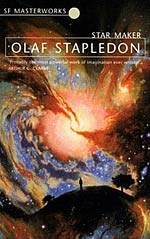
![]() Triseult
Triseult
3/23/2013
![]()
If you like SF stories that project far, far into the distant future, then Star Maker will leave you breathless. I don't think there's a single book in existence that can dwarf the scope and grandeur of this one. How can you write something bigger than the ultimate destiny of all the Universes in existence?
If Star Maker had been published in 2013, it would be a marvel of scope and imagination. But for a book published in 1937, its inventiveness is mind-boggling. I'm left with the same sense of awe I felt when I first read The Lord of the Rings, and realized that it was the progenitor and unrivaled superior to all the sword and sorcery novels I read as a kid. You can see in Star Maker so many of the seeds that would grow in other SF authors' minds, from Arthur C. Clarke to Stephen Baxter, and even Iain M. Bank's Culture series. There's a cornucopia of fantastic SF ideas here; from hive minds to planet ships, and even the very first appearance of the Dyson sphere.
That's not to say that Star Maker will feel familiar to SF readers. The book is quite unique in the history of SF for its tone, message, and overall purpose. There is only the fleeting concept of a protagonist, and although the story moves forward in time towards a final resolution, it doesn't carry the tension of a dramatic arc. Instead, Star Maker is a chronicle of the future of the Galaxy, the Universe, and beyond.
At its heart, Mr. Stapledon's book reads half like a chronicle of the future, half as a philosophical treatise on the meaning of existence and the yearning for lucidity and understanding. As a philosophical work, it stands on its own as well; it's fascinating to read about Star Maker's future civilizations, and their struggle between the impulse for conflict and the search for truth and unity. Star Maker eventually takes a turn for the religious, but it does so with enough of a sense of allegory and myth that it doesn't lose its philosophical potency. Still, it bears mentioning that at its core, Star Maker is a religious book. I'm pleased that Stapledon decided to articulate his religious musings in scientific terms, too; that's a conjunction we rarely ever see these days.
There are, obviously, some elements that date this novel. Some of the science is wrong based on our modern understanding of the Universe, but there is enough of a sense of rigor according to the theories of the time that it's easy to overlook. A lot of the ways Stapledon articulates his religious concepts are transparently Christian, but there is also some acknowledgement of East Asian philosophy, long before it became in vogue in the West, so it's easy again to overlook. If there's one thing I deplore with the novel, and it's a minor thing, really, is that the overall narrative is extremely masculine. Yes, the point of view is of entire species, but there is very little discussion of gender except in the context of reproduction. It's not a huge thing by any means, but there's definitely a sense of a very masculine book and narrative. It doesn't help that all alien species are designated as "Men". But then, it bears repeating: 1937.
If you want to ponder the distant future of our Universe, this is the book to pick up. You won't get a SF story with a dramatic arc and epic space battles, but what you'll get is a rich, challenging philosophical treatise on the meaning of life, and how our own individual struggles connect us to the moral arc of the Universe. It's pretty well-written, too.